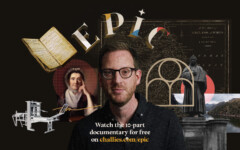Theology remains something of a bad word in Christian circles. I’d believe that the success of a book like The Shack has proven this to us yet again. Many people seem eager to embrace some form of Christian spirituality but have little desire or love for theology. Theology is linked in people’s minds with frigid, dead religion that cares more about principles and matters of the head than deeds and matters of the heart. It is associated with fundamentalism and with cold conservatism. We need only look at the meaning and etymology of the word, though, to conclude that God requires all Christians to be theologians.
The word theology, as I’m sure you know, is derived from two Greek words. The root “theos” means God and the suffix “-ology” comes from the Greek word for speak. So what theology really means is “speaking of God” or as has become the more accurate definition, “the study of God.” That sounds quite inoffensive, doesn’t it? If you are a Christian, I suspect that it sounds exciting. If you love God and if you are loved by God, you will want to know him. I don’t think any Christian can deny that we are called by God to learn more about him and to study his ways. The process of sanctification is just that–learning more and more about God and his requirements for our lives. Our lifelong challenge is to mold our lives to fit into that image.
So what is it, then, that people are rebelling against when they disassociate themselves from theology? I believe that what they are running from is better termed “theology-ology.” It is a study of the study of God. If a Christian is diligent in studying God through the right motives and methods and for the right reasons, there will necessarily be change in his life. He cannot help but be changed by the living Word of God. However, if someone studies God only to acquire knowledge about him without applying any of that knowledge to his life, he is not so much studying God as he is studying the study of God. The study of God when done as he has commanded must always lead to application, heart change and then life change. Conversely, studying God through improper motives and methods with no view to application cannot affect true heart change in anyone.
There seems to be a fine line between theology and theology-ology. The line is not found in what we study as much as it is the motives behind the study and the result we expect to achieve. For example, 1 Corinthians 11 speaks about the necessity of women wearing head coverings while in church. I can look at that section of the Bible in two different ways. I can go in with a motive of wanting to show that women are subservient to men and sin if they do not wear head coverings in church. I can begin this study with the intent to prove to my wife that she needs to wear a head covering next Sunday. On the other hand, I can turn to this section with a motive of wanting to understand what God is trying to teach us in this passage. I can seek to understand the principles the Bible is teaching and how those relate to people today. I can begin my study with the intent to learn something that I can humbly and prayerfully apply to my life. This is an extreme or simplistic example perhaps, but it displays the difference between wanting to acquire knowledge of God through proper or improper methods and for right or wrong intentions.
I love theology. I love studying God and continually learning about him and about what he has done. I must confess that there is a part of me that also loves to study the study of God. There are many times in my life where I have learned about God simply so I could have more knowledge about him, never intending to change myself in response to what I have learned. There have been times where I have studied God just so I could convince others of their need to change. It is my prayer that whenever I study God I do so with proper motives and with a humble attitude, preparing myself to be changed by what I learn about him.










